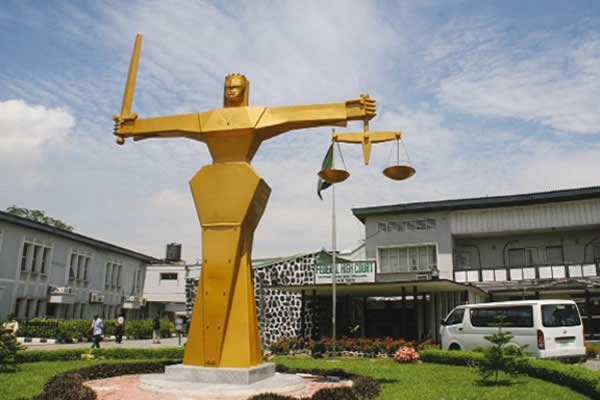2023 – Where is the protection from judicial misconduct?
More than any other branch of government, the judiciary is the major check and balance against all other arms of government and needs public faith. Judges do not command armies or police forces, they do not have control over large sums of money or have the power of the treasury at their disposal, and they […]

More than any other branch of government, the judiciary is the major check and balance against all other arms of government and needs public faith. Judges do not command armies or police forces, they do not have control over large sums of money or have the power of the treasury at their disposal, and they do not pass legislation. Their job is to make rulings on the law, which people will believe came from competent, and unbiased judicial officers. This they have serially failed to do.
There is no doubt that the judiciary is challenged by a backlog of cases, corruption, limited access to justice and the need for technological advancement, but this is not the main problem. As the judiciary is now seemingly inextricably entrenched in declaring election winners, far too many political leaders and leaders of thought express the opinion that they have been compromised, lost respect, and are no longer the hope of the common man. This is lamentably true because far too many judgments by Nigerian courts these days are illogical and offensive both to logic and to millions of Nigerians.
In 2024 there are more state elections on the horizon and there is fading hope that the results will be acceptable or the declared winners will be the true winners! In 2023 both the Presidential Election Petitions Court (PEPC) and the Supreme Court squandered the opportunity to reprimand the Independent National Electoral Commission (INEC) for their reckless, incompetent, corrupt, and lawless conduct of the elections leading to a proliferation of litigations.
As usual, the appellate courts are regularly overturning sound judgments while upholding absurd ones! Faced with the dilemma of needing to declare a winner of the presidential election against the totally unacceptable, illegal and incompetent manner in which the election was conducted, the PEPC and Supreme Court abdicated their duty to enforce both ethics and law. It was an extremely bad omen for those who look towards the judiciary as a stabilizing force in Nigerian democracy.
Yuletide: FG to allow Nigerians with expired passports return home
Ex-Senate President Lawan tasks FG on livestock investment
The courts have become an integral part of the problem and not part of any solution. Tragically it’s not only in the field of politics that the courts are letting the nation down. Dispensation of justice in Nigeria is a time-wasting process, which is why many Nigerians are now taking the law into their own hands.
On average it takes three years for a relatively simple case to be concluded. Almost 15 years ago in 2009, a Central Bank of Nigeria (CBN) exercise exposed large criminality by several bank chief executives who were charged with fraud, market manipulation, concealment, and grant of credit facilities without adequate securities.
To date, only one case has been prosecuted successfully! The Economic and Financial Crimes Commission (EFCC) responsible for prosecuting corruption cases is notoriously incompetent with regard to successful high-profile prosecutions.
The judiciary must take up the gauntlet, wake up to its responsibilities, and support measures that hold it accountable for delays in the dispensation of justice. There is no disputing that while there are indeed many judges who serve with honour, the pervasive lack of ethics needs to be corrected and major breaches of trust acknowledged. The judiciary should not expect to be respected when it has lost the trust and confidence of the people who no longer believe judges are fair and impartial. Indeed, the rule of law has gone out of the window.
There are many different forms of judicial misconduct and errant ethical standards ranging from improper demeanour, failure to disqualify judges over a conflict of interest, approving ex-parte applications which overturn the status quo, and failure to conclude cases within a sensible and decent time frame.
Although the judicial code includes language which urges judges to preserve the integrity of the court and avoid any appearance of impropriety, unfortunately, the National Judicial Council has been unable to draw a line at the point where a judge’s ruling constitutes such a violation of fundamental rights that it represents impunity against the law.
Nigerian judges are busy jailing poor people by pedantically rejecting bail applications, thereby filling prisons with awaiting-trial inmates who far outnumber convicted prisoners! They are also guilty of inventing improper remedies for cases and routinely exhibiting behaviour which has brought them into contempt.
Judges are supposed to maintain the dignity of the office at all times and avoid impropriety and the appearance of impropriety in both their professional and personal lives, but sadly this is no longer the case. Legislating to regulate judicial behaviour without violating the separation of powers is absolutely vital if Nigerian democracy is going to prosper and not collapse under the weight of injustice. Naturally, there will be unpopular but correct judicial rulings, but these are few and far between. What is important is that the admonition “go to court” should not be a joke which means there is nothing you can do about getting justice!
Implementing a meaningful manner in which the public can be protected from judicial misconduct is vital for the survival of democracy in 2024. Former United States President Theodore Roosevelt was famously quoted as saying “No man is above the law and no man is below it, nor do we ask any man’s permission when we ask him to obey it. Obedience to the law is demanded as a right not as a favour”. This implies that in the administration of justice, it is vital that judges must be seen as ethical and subject to meaningful correction when necessary.
